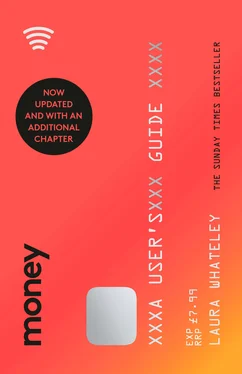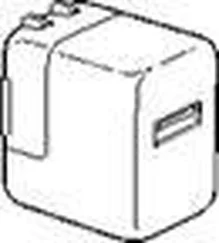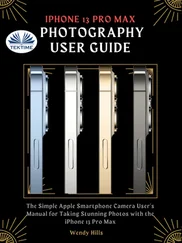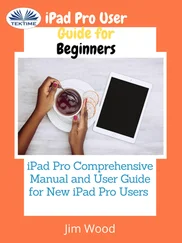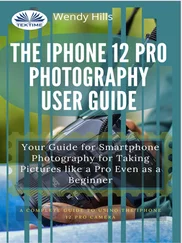Agents can now charge only for rent, a refundable holding deposit and security deposit, and a select few ‘default’ fees, including for late payment of rent by more than 14 days and if you lose your keys. This default fee loophole was closed because of fears, as I wrote in the first edition of this book, that agents would charge for unreasonable defaults like, as housing charity Shelter has seen, £3 per skirting board for failing to remove dust, and £45 for a replacement dustpan and brush. This is no longer allowed, so if you are in this situation, challenge it.
What fees you have to pay up front, and questions to ask before you part with them
When you have found a property you want to rent you will generally need to go through a credit-check process (if you are worried about your credit history see chapter 2on how to improve it), which is where you are rated on how likely you are to pay your rent on time. You may also need to show bank statements and provide references, such as your old landlord or employer, or failing that, to offer a guarantor, such as a parent, who will agree to cover your rent if you cannot meet it. You then have to cough up a lot of money for a deposit.
Some agents or landlords require a holding deposit, which is a sum of rent paid to secure the property you want while the letting agent checks your references. This can be no more than a week’s rent. Do not pay until you are sure you want the property, because you may not be able to get this deposit back if you don’t. Usually it will be taken off your tenancy deposit. Get the holding-deposit details in writing, including what will happen to it if your landlord changes their mind and you can’t move in.
You usually also have to pay your first month’s rent in advance. You then need to add on the tenancy deposit. Since June 2019, tenancy deposits are capped at five weeks’ rent if your total annual rent is less than £50,000, or six weeks at £50,000 or above.
Always get receipts whenever you pay anything, in case there are any issues further down the line. Before you pay or sign, see if you can negotiate the cost of the rent. These things are not fixed and agents or landlords may be trying it on.
You also need to ask a few questions: how and when you will be paying rent, and whether the rent includes any bills; how long you can rent for – the length of your tenancy – and whether you are entitled to end it early. Are there any rules on what you can and can’t do in the flat – for example, have parties, keep a dog, smoke?
Ask to see the property’s Energy Performance Certificate (EPC). Legally a property you rent must have an energy-efficiency rating of at least E, unless it is exempt, in which case there is a register for exempt properties on gov.uk. If the property is an F or G your landlord is breaking the law and can be fined.
If you are moving into a shared house with several flatmates your home should be licensed with the local council as a house in multiple occupation (HMO) to make sure it is safe and not at risk of overcrowding. This is worth checking.
Also, it may sound obvious, but do actually view the property you want to rent in situ, rather than just online, before parting with any cash. There are lots of online rental scams out there, particularly targeting students, where you pay upfront fees to secure properties that either do not actually exist or have already been rented out, sometimes multiple times.
Need to know: what are tenancies?
Most private renters will sign an assured shorthold tenancy. Have a good read of the tenancy agreement before you sign it, which lays out what responsibilities your landlord has and how to end or renew your tenancy. Make sure you are given a written tenancy agreement, one in five millennial renters told consumer group Which? that they did not get one when moving. Most shorthold tenancies last six or twelve months, and you have to pay the agreed rent for this whole period. After this fixed period you can agree a new contract, or allow the tenancy to continue. If you want to leave at the end of the fixed term you probably need to give written notice in advance; your agreement should tell you how much notice you need to give. A landlord can end your tenancy without reason – outside of the fixed period – but needs to give you written notice. Until at least March 2021 – extended to help those affected by the impact of coronavirus – this has to be six months, under a law known as section 21, and provided that your leaving date falls at least six months after your original tenancy began. The government has pledged to ban these section 21 no-fault evictions, making renting more secure, but it is not clear yet when this will make it into law.
If you are living with other people you may sign a joint tenancy agreement. This means that you are all responsible for rent, and for sticking to the terms of your agreement. If your flatmate moves out and refuses to pay rent, you will be lumbered with it instead, so pick your roomies carefully.
How your deposit is protected
Landlords have to keep your deposit safe by putting it into a deposit-protection scheme within thirty days of you paying it, or will ask a letting agent to protect your deposit for them. The deposit has to be in a government scheme, and your landlord needs to tell you which one. There are three: Deposit Protection Service (DPS), Tenancy Deposit Scheme (TDS) and My Deposits.They are also allowed to use an insurance scheme to protect it, instead.
You may be given a ‘repayment ID’ from the scheme. Keep it safe: you need it to get your deposit back at the end of your tenancy.
How do I get my deposit back?
Landlords can only deduct money from your deposit for damage, cleaning costs if you have left the place in a worse state than when you moved in, and any missing items. Their right to do this needs to be detailed in your tenancy agreement. They cannot deduct money for normal wear and tear – for example, scuffs on the walls or faded carpets. Damage needs to be things like a massive iron burn in the middle of the floor.
Check your agreement to see whether you are supposed to have the property professionally cleaned before you move out.
You will agree an inventory when you first move in: a document detailing what is in the property and its condition. Take lots of photos, inside and out, to make a record of any existing issues. You might also want to take photos of the property to show what it is like as you move out, and do a check-out inventory, getting your landlord to sign it, as your back-up if there is any dispute.
You have to contact your landlord or letting agent to request your deposit back. Best do it by email or in writing, so that you have evidence of the date. You should get it back within ten days. If they refuse, or take longer, or if you don’t agree with any deductions they make, you can contact the deposit-protection scheme where your money is kept and go through their free dispute-resolution process. If your landlord has made any deductions they should write to you to explain how much and why.
Shelter has a useful template letter on its site to help you challenge any deductions that you think are unfair. As a last resort you could go to the small claims court if you still cannot get back your deposit.
How you can avoid paying an upfront deposit
If you can’t afford to pay a large deposit up front there are some new products available to help you get around it. Companies like the Zero Deposit Scheme (ZDS) and Reposit offer what is basically an insurance policy for the landlord instead. With both you pay the equivalent of one week’s rent (rather than the normal six required for most security deposits); with ZDS you also pay a £26 annual admin fee for each additional year you are in the same property, and it guarantees to cover your landlord for the same sum as a traditional security deposit.
Читать дальше
